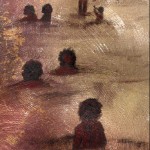Self awareness and autism
 Over on the 2009 online AWARES International Autism Conference the host there, Adam Feinstein, wrote:
Over on the 2009 online AWARES International Autism Conference the host there, Adam Feinstein, wrote:
What do you think of the latest study (from the University of Cambridge) showing that the brains of people with autism are less active when engaged in self-reflective thought. The volunteers were asked to make judgements either about their own thoughts, opinions, preferences or physical characteristics, or about someone else’s, in this case the Queen. By scanning the volunteers’ brains as they responded to these questions, the researchers were able to visualise differences in brain activity between those with and without autism.
They were particularly interested in part of the brain called the ventromedial pre-frontal cortex (vMPFC) – known to be active when people think about themselves. The researchers found this area of the brain was more active when typical volunteers were asked questions about themselves compared with when they were thinking about the Queen. However, in autism this brain region responded equally, irrespective of whether they were thinking about themselves or the Queen. The study’s lead author, Michael Lombardo, said: “The atypical way the autistic brain treats self-relevant information as equivalent to information about others could derail a child’s social development, particularly in understanding how they relate to the social world around them.”
I’d love to hear your thoughts on this. Many thanks.
Best wishes,
Adam
I replied:
I had very little physical sense of self due to body processing issues so would regularly be doing things with no idea what I was doing and definitely no sense of embarrassment (but on the other hand had a high sense of social invasion which balanced that out). I regularly crossed a room with no idea how I got there. I relied heavily on mirrors and reflection to know where I was in space, to witness myself in my body and to get any comparison of my own physicality with that of others. Over time I developed an ability to FEEL as if I’m myself from outside of myself.
I was meaning deaf to my own words until late childhood it was very difficult to hold back on involuntary speech (echolalia etc) but my mid-late teens I could roughly self monitor but lots of ‘waffle’ and involuntary speech in between intentional speech. Gestural signing and tracking via representational objects gained me ability to limit and track my own speech. Over time this became less needed as I FEEL as if I’m using these things now even if I’m not.
Because of a combination of decades of Exposure Anxiety (which makes it very hard to handle conscious self awareness) and Alexithymia, I learned to read my face and body movements externally through my hands or reflection and I map very well how people move so I have used that to reflect back on my own nuances. So I used the mapping of others to develop a map by which to measure what my stuff may be saying. Understand this isn’t usual facial expression or body language… more micro movements and parts of the face and body rather than as a whole… so I get a lot from watching shoulders, feet, grip.
From late childhood up to my late teens, (before that I was considered feral or disturbed) I was considered bright because I could find innovative ways of escape and being meaning deaf and meaning blind meant I would explore things in very unusual ways so that can be read as backward or bright, depending. But I was considered to have ‘no common sense whatsoever’ and generally considered to have very poor insight. It was age 9 I began to type and by 13 I began to use typing a lot for poetry and by about 14-17 did some drawing and by 19 I was composing a lot of songs and music at 19-25 I’d developed scan reading so scanned volumes and volumes of books and by 27 I’d started painting and at 26 wrote my first of 9 books and so by my 30s and 40s I’d taken all these things so much further.  And ALL were ‘automatic’ expression… all would come out pretty much with the same feeling as the beahviours and involuntary speech once had, except I’d become aware of these arts AS they’d pour out and through that these arts taught me, they awakened me. But those who met would now would easily imaging I was always very self aware and insightful.
I do feel I had poor self awareness or insight until my late teens but I do feel that with Exposure Anxiety there’s an excruciating sense of one’s own EXISTANCE so in that sense I had a heightened emotional discomfort from any feedback of my existance and this kind of gave me SOME strong sense of self, but a very intangible sort of version… a bit like saying I could feel my GEIST, my SOUL, my GHOST, but couldn’t experience my mind, thoughts, body well.
I definitely STRONGLY support arts, typing, mirrors and sensory programs in developing sense of and expression of self.
The AWARES conference has been extended to Dec 18th.
Donna Williams, Dip Ed, BA Hons.
Author, artist, singer-songwriter, screenwriter.
Autism consultant and public speaker.
http://www.myspace.com/nobodynowherethefilm
http://www.donnawilliams.net
http://www.aspinauts.com

I know someone who was in the study. They said the questions had hardly anything to do with self awareness at all and that they were pretty difficult to engage with. So the study was probably not even measuring self awareness at all.
ironic 🙂
I am wondering if this is a form of ‘dissociation’ resulting from an intensely shocking experience when the baby was not able to handle it.